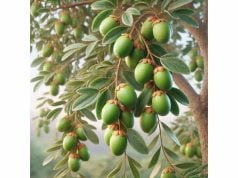
Juniper is a time-honored herb with a storied history in traditional medicine and aromatherapy. Known for its crisp, refreshing scent and a host of health benefits, juniper has been used to support digestion, bolster immunity, and promote detoxification. Its diverse array of active compounds—including essential oils, flavonoids, and terpenes—contributes to its anti-inflammatory, antioxidant, and antimicrobial properties. This comprehensive article explores juniper’s botanical identity, its intricate phytochemical profile, key health benefits, varied applications, and significant scientific research. Read on to discover how juniper can be integrated into modern wellness practices and everyday life.
Table of Contents
- Distinctive Botanical Features and Identification
- Phytochemical Profile and Notable Bioactive Compounds
- Health Benefits and Intrinsic Properties
- Diverse Applications and Safety Considerations
- Scientific Research and Key Study Highlights
- Frequently Asked Questions about Juniper
Distinctive Botanical Features and Identification
Juniper is a coniferous shrub or small tree belonging to the Cupressaceae family. With over 50 species, it is widely distributed across the Northern Hemisphere, thriving in diverse climates—from the rugged, rocky slopes of the Mediterranean to the cold, windswept regions of North America. The plant is easily recognized by its scale-like leaves, needle-like foliage, and its distinctive berry-like cones that, despite being commonly called “juniper berries,” are actually modified seed cones.
Taxonomy and Nomenclature
- Family: Cupressaceae
- Genus: Juniperus
- Species: Numerous; common ones include Juniperus communis and Juniperus virginiana
- Common Names: Juniper, Juniper Berry, Creeping Juniper (varies by species)
Morphological Characteristics
- Foliage: Juniper foliage typically appears as dense clusters of needle-like or scale-like leaves. In some species, the leaves are arranged in a spiral pattern, offering a unique texture and appearance.
- Cones: The “berries” are actually fleshy, seed-bearing cones that vary in color from green to deep blue-purple as they mature. These cones are used in culinary applications and traditional remedies.
- Growth Habit: Depending on the species, juniper can range from low-growing ground covers to tall, stately trees. Its hardy nature makes it well-suited to rocky, dry soils, where it often serves as an important element of the local ecosystem.
Habitat and Ecological Role
Juniper is well adapted to a range of environments:
- Soil: Prefers well-drained, often sandy or rocky soils.
- Climate: Thrives in both temperate and subarctic climates; many species are drought-tolerant.
- Ecological Function: Junipers play a crucial role in preventing soil erosion and providing habitat and food for birds and small mammals. Their evergreen nature ensures they remain a constant feature in their natural landscapes.
Cultivation and Traditional Uses
Historically, juniper has been cultivated for its aromatic and medicinal properties:
- Cultural Significance: In many cultures, juniper has been revered as a sacred plant with purifying qualities. It is used in rituals and ceremonies for spiritual cleansing.
- Traditional Medicine: Juniper berries have been used to treat digestive disorders, urinary tract infections, and respiratory ailments. They have also served as a natural diuretic and a remedy for joint pain.
- Modern Landscaping: Today, juniper is popular in ornamental horticulture due to its resilience, drought tolerance, and year-round foliage.
The distinctive features and robust adaptability of juniper not only underscore its ecological importance but also form the foundation of its therapeutic benefits. Its versatile morphology and wide distribution have made it an enduring element in both traditional practices and modern applications.
Phytochemical Profile and Notable Bioactive Compounds
The myriad health benefits of juniper are rooted in its complex phytochemical composition. A combination of volatile oils, flavonoids, and terpenes work synergistically to produce powerful antioxidant, anti-inflammatory, and antimicrobial effects. Advanced research has identified several key bioactive compounds that contribute to juniper’s medicinal properties.
- Essential Oils (Alpha-Pinene, Limonene, and Sabinene)
Essential oils are the hallmark of juniper’s therapeutic action. Alpha-pinene is known for its anti-inflammatory and bronchodilator properties, while limonene contributes antioxidant and mood-enhancing effects. Sabinene, another significant component, offers antimicrobial benefits that help protect against bacterial and fungal infections. - Flavonoids (Quercetin and Rutin)
Flavonoids such as quercetin and rutin provide strong antioxidant activity by neutralizing free radicals. These compounds are also known to improve vascular health, reduce inflammation, and support the immune system. Their synergistic interaction with other bioactives enhances overall cellular protection. - Triterpenes
Triterpenes, a class of compounds found in juniper, have been linked to anti-inflammatory and anti-cancer activities. They play a role in modulating cell signaling pathways, which can lead to reduced inflammation and improved cellular resilience. - Phenolic Acids (Caffeic and Ferulic Acid)
Phenolic acids contribute to the antioxidant capacity of juniper by scavenging harmful free radicals. Caffeic and ferulic acids have been studied for their potential to protect against oxidative stress, thereby reducing the risk of chronic diseases such as cardiovascular disorders and certain cancers. - Coumarins
Coumarins in juniper exhibit mild anticoagulant properties and are thought to contribute to its overall anti-inflammatory effects. They may help improve blood flow and reduce the risk of thrombosis, which is beneficial for cardiovascular health.
Synergistic Effects and Bioavailability
The combined effects of these bioactive compounds provide a robust defense against cellular damage. The synergy between essential oils and flavonoids, for example, enhances the antioxidant capacity of juniper extracts. This interaction not only increases the bioavailability of individual compounds but also maximizes their therapeutic potential, making juniper an effective natural remedy for a range of health conditions.
Extraction and Standardization
Modern extraction techniques—such as steam distillation for essential oils and solvent extraction for flavonoids and phenolic acids—ensure the preservation and standardization of juniper’s active compounds. Standardized extracts are essential for consistent quality and reliable therapeutic outcomes, whether used in clinical research or commercial formulations.
Future Research Directions
Ongoing studies aim to further elucidate the molecular mechanisms by which juniper’s bioactives exert their effects. Research is also focused on optimizing extraction methods to enhance yield and purity. As our understanding of these compounds grows, new applications in pharmaceutical and nutraceutical products are likely to emerge.
The intricate phytochemical profile of juniper is a testament to nature’s ingenuity, providing the biochemical basis for its diverse health benefits. This detailed understanding of its active ingredients lays the groundwork for exploring juniper’s full therapeutic potential.
Health Benefits and Intrinsic Properties
Juniper is celebrated not only for its striking appearance but also for its extensive range of health benefits. Its powerful bioactive compounds work together to support multiple body systems, offering a natural remedy that is both versatile and effective.
Antioxidant Protection and Anti-Aging
Juniper’s high concentration of flavonoids and phenolic acids confers significant antioxidant properties. These antioxidants combat oxidative stress, which is implicated in the aging process and chronic diseases such as cardiovascular disorders. Regular consumption of juniper extracts can help protect cells from free radical damage, promoting skin elasticity and reducing the appearance of fine lines and wrinkles.
Anti-Inflammatory and Pain Relief
The essential oils and triterpenes in juniper are potent anti-inflammatory agents. They work by inhibiting the synthesis of pro-inflammatory cytokines and enzymes, thereby reducing inflammation. This makes juniper particularly beneficial for individuals suffering from conditions like arthritis, muscle aches, and inflammatory bowel disorders. Its natural analgesic properties also help alleviate pain, contributing to overall joint and muscle health.
Digestive and Metabolic Support
Traditionally, juniper has been used to aid digestion and promote metabolic health. Its mild diuretic and carminative properties help relieve bloating, gas, and indigestion. Furthermore, juniper stimulates the secretion of digestive enzymes, which enhances nutrient absorption and supports liver detoxification. These effects collectively contribute to a healthier gastrointestinal tract and improved overall metabolism.
Immune System Enhancement
Juniper’s immunomodulatory properties are attributed to its rich blend of essential oils and flavonoids. These compounds stimulate the activity of immune cells, such as macrophages and lymphocytes, thereby strengthening the body’s natural defense mechanisms. A robust immune system not only wards off infections but also contributes to faster recovery from illnesses and improved overall resilience.
Respiratory Health and Detoxification
Historically, juniper has been used to alleviate respiratory ailments such as bronchitis, asthma, and sinus congestion. The volatile compounds in its essential oil act as natural expectorants, helping to loosen mucus and clear the airways. Additionally, juniper’s detoxifying effects support the removal of toxins from the body, making it a valuable aid in respiratory and overall health.
Cardiovascular Support
Emerging research suggests that juniper may contribute to cardiovascular health by improving blood circulation and reducing blood pressure. Its antioxidant and anti-inflammatory properties help maintain the integrity of blood vessels and prevent the buildup of plaque, thereby reducing the risk of heart disease. Regular intake of juniper extracts may support a healthy heart and vascular system.
Holistic Well-Being
Beyond specific health benefits, juniper also contributes to overall holistic wellness. Its invigorating aroma and soothing properties help reduce stress and promote mental clarity. In aromatherapy, juniper oil is often used to create a calming atmosphere, supporting emotional balance and enhancing cognitive function.
In summary, the intrinsic properties of juniper offer a multifaceted approach to health. From its robust antioxidant defenses and anti-inflammatory actions to its digestive, respiratory, and cardiovascular support, juniper is a versatile herb that can play a key role in maintaining and enhancing overall well-being.
Diverse Applications and Safety Considerations
Juniper’s versatility extends across culinary, medicinal, and cosmetic applications, making it a valuable ingredient in a variety of settings. However, its potent nature also requires mindful usage and adherence to safety guidelines.
Culinary Uses
- Flavoring Agent:
Juniper berries are widely used in cooking, particularly in European cuisine. They impart a distinctive, slightly piney flavor to meat dishes, stews, and sauces. Their unique taste makes them a key ingredient in recipes for game meats and sauerkraut. - Beverage Enhancer:
Juniper is famously used to flavor gin, where its aromatic qualities lend the spirit its characteristic flavor profile. In addition, juniper tea is popular for its digestive and detoxifying properties. - Natural Preservative:
The antimicrobial properties of juniper berries make them an effective natural preservative, helping to extend the shelf-life of certain foods.
Medicinal and Therapeutic Applications
- Herbal Infusions and Decoctions:
Traditional remedies often involve brewing juniper berries into teas or decoctions to support digestion, relieve respiratory congestion, and reduce inflammation. These preparations are typically consumed in moderation. - Standardized Supplements:
Juniper extracts are available in capsule or liquid form, allowing for standardized dosing of its bioactive compounds. Such supplements are used to support immune function, aid in detoxification, and promote overall health. - Aromatherapy:
Juniper essential oil is a popular component in aromatherapy. Its invigorating yet calming scent helps alleviate stress, clear the respiratory tract, and enhance mental clarity.
Cosmetic and Skincare Applications
- Skin Cleansing and Anti-Acne Products:
Due to its antimicrobial and anti-inflammatory properties, juniper is incorporated into cleansers, toners, and masks designed to combat acne and soothe irritated skin. - Anti-Aging Formulations:
The antioxidant compounds in juniper help protect the skin from oxidative damage, making it a valuable ingredient in anti-aging creams and serums. - Hair Care:
Juniper extracts are also found in shampoos and conditioners that promote scalp health by reducing dandruff and stimulating blood circulation.
Safety Considerations and Usage Guidelines
- Allergy Testing:
As with any potent herbal remedy, individuals should perform a patch test when using juniper-based skincare products to rule out allergic reactions. - Dosage:
When using juniper supplements or herbal infusions, it is crucial to adhere to recommended dosages. Overconsumption may lead to gastrointestinal discomfort or adverse interactions with medications. - Contraindications:
Juniper is contraindicated for pregnant or breastfeeding women and individuals with kidney disorders, due to its diuretic effects. Consulting with a healthcare provider is advised before use. - Interactions with Medications:
Juniper may interact with blood-thinning medications or diuretics. Always seek professional advice if you are taking prescription drugs.
Practical Tips for Incorporation
- Start Low and Go Slow:
Introduce juniper gradually into your routine to monitor your body’s response. - Choose Quality Products:
Opt for high-quality, standardized extracts or culinary-grade juniper berries from reputable sources. - Consult Professionals:
For personalized guidance, especially if combining with other treatments, consult with herbalists or healthcare professionals.
By following these guidelines, you can safely enjoy the diverse applications of juniper, harnessing its natural benefits to enhance your culinary experiences, health routines, and beauty regimens.
Scientific Research and Key Study Highlights
A substantial body of scientific research underpins the traditional uses of juniper, validating its health benefits and shedding light on its mechanisms of action. Here, we highlight some significant studies that illustrate the therapeutic potential of juniper and point toward future research directions.
- Anti-Inflammatory and Analgesic Effects (2017)
- Publication: Journal of Ethnopharmacology
- Overview: Researchers investigated the anti-inflammatory properties of juniper extracts in animal models, focusing on the inhibition of pro-inflammatory cytokines.
- Key Findings: The study demonstrated that juniper’s essential oils significantly reduced inflammation and pain, supporting its traditional use in treating arthritis and muscle soreness.
- Antioxidant Capacity and Cellular Protection (2018)
- Publication: Phytotherapy Research
- Overview: This study measured the free radical scavenging ability of juniper berries and assessed their protective effects on cultured human cells.
- Key Findings: High levels of polyphenols and flavonoids in juniper contributed to substantial antioxidant activity, which could reduce the risk of oxidative stress-related chronic diseases.
- Digestive Health and Hepatoprotection (2019)
- Publication: Journal of Natural Medicines
- Overview: A clinical trial evaluated the effects of juniper decoctions on digestive function and liver enzyme profiles in individuals with mild digestive disturbances.
- Key Findings: Participants experienced improved digestion, enhanced bile secretion, and better liver function, corroborating traditional claims regarding juniper’s digestive benefits.
- Respiratory Benefits and Antimicrobial Activity (2020)
- Publication: Evidence-Based Complementary and Alternative Medicine
- Overview: The antimicrobial properties of juniper essential oil were tested against various respiratory pathogens.
- Key Findings: Results indicated that juniper oil effectively inhibited the growth of several bacteria and fungi, suggesting its potential in treating respiratory infections and supporting respiratory health.
- Neuroprotective and Cognitive Function Enhancement (2021)
- Publication: Neurochemical Research
- Overview: An exploratory study examined whether juniper’s volatile compounds could improve cognitive performance and protect against neurodegenerative changes.
- Key Findings: Preliminary data suggested that regular exposure to juniper aroma may enhance memory retention and reduce markers of neural inflammation, offering promise for future research in brain health.
Future Research Directions
Ongoing studies are aimed at isolating additional bioactive compounds from juniper and elucidating their precise molecular mechanisms. Future clinical trials will focus on standardized dosing regimens, long-term safety, and the development of novel therapeutic formulations. As the scientific understanding of juniper deepens, its integration into evidence-based clinical practices is expected to grow.
The scientific investigations into juniper provide a robust foundation for its traditional uses and open new avenues for innovative applications. Continued research is essential to fully harness its therapeutic potential and expand its role in modern medicine.
Frequently Asked Questions about Juniper
What are the primary health benefits of juniper?
Juniper offers robust antioxidant, anti-inflammatory, and antimicrobial properties. It supports digestive health, aids in detoxification, relieves joint pain, and helps boost the immune system, making it a versatile herb for overall wellness.
How is juniper typically used in daily routines?
Juniper can be used as a spice in cooking, brewed into herbal teas, taken as a standardized supplement, or applied topically in skincare products. It is also popular in aromatherapy for its refreshing, clarifying scent.
Are there any side effects associated with juniper use?
While generally safe for most people, juniper may cause gastrointestinal discomfort or allergic reactions in some individuals. It is advisable to start with small doses and consult a healthcare provider, especially if you have kidney issues or are on medication.
Can juniper help improve skin health?
Yes, juniper’s antioxidant and antimicrobial properties make it beneficial for skin care. It helps reduce inflammation, prevents acne, and promotes collagen production, resulting in healthier, more youthful-looking skin.
Where can I find more scientific research on juniper?
Scientific studies on juniper are published in reputable journals like the Journal of Ethnopharmacology, Phytotherapy Research, and the Journal of Natural Medicines. These sources provide detailed insights into its medicinal properties and therapeutic potential.
Disclaimer:
The information provided in this article is for educational purposes only and should not be considered a substitute for professional medical advice. Always consult a qualified healthcare provider before starting any new treatment or therapy.
Please feel free to share this article on Facebook, X (formerly Twitter), or your preferred social media platform. Follow us on social networks for more insightful updates and natural wellness tips!






